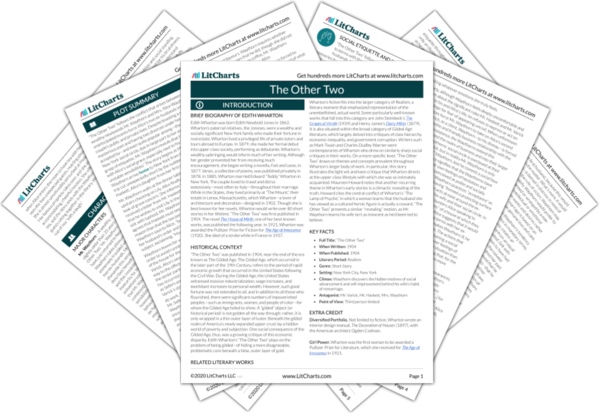Mr. Haskett Quotes in The Other Two
As his door closed behind him he reflected that before he opened it again it would have admitted another man who had as much right to enter it as himself, and the thought filled him with a physical repugnance.
But this other man…it was grotesquely uppermost in Waythorn’s mind that Haskett had worn a made-up tie attached with an elastic. Why should that ridiculous detail symbolise the whole man? Waythorn was exasperated by his own paltriness, but the fact of the tie expanded, forced itself on him, became as it were the key to Alice’s past.
A man would rather think that his wife has been brutalised by her first husband than that the process has been reversed.
She was ‘as easy as an old shoe’ —a shoe that too many feet had worn. Her elasticity was the result of tension in too many different directions. Alice Haskett—Alice Varick—Alice Waythorn—she had been each in turn, and had left hanging to each name a little of her privacy, a little of her personality, a little of the inmost self where the unknown god abides.
He could have forgiven her for blunders, for excesses; for resisting Haskett, for yielding to Varick; for anything but her acquiescence and her tact.
With grim irony Waythorn compared himself to a member of a syndicate. He held so many shares in his wife’s personality and his predecessors were his partners in the firm.

Mr. Haskett Quotes in The Other Two
As his door closed behind him he reflected that before he opened it again it would have admitted another man who had as much right to enter it as himself, and the thought filled him with a physical repugnance.
But this other man…it was grotesquely uppermost in Waythorn’s mind that Haskett had worn a made-up tie attached with an elastic. Why should that ridiculous detail symbolise the whole man? Waythorn was exasperated by his own paltriness, but the fact of the tie expanded, forced itself on him, became as it were the key to Alice’s past.
A man would rather think that his wife has been brutalised by her first husband than that the process has been reversed.
She was ‘as easy as an old shoe’ —a shoe that too many feet had worn. Her elasticity was the result of tension in too many different directions. Alice Haskett—Alice Varick—Alice Waythorn—she had been each in turn, and had left hanging to each name a little of her privacy, a little of her personality, a little of the inmost self where the unknown god abides.
He could have forgiven her for blunders, for excesses; for resisting Haskett, for yielding to Varick; for anything but her acquiescence and her tact.
With grim irony Waythorn compared himself to a member of a syndicate. He held so many shares in his wife’s personality and his predecessors were his partners in the firm.











